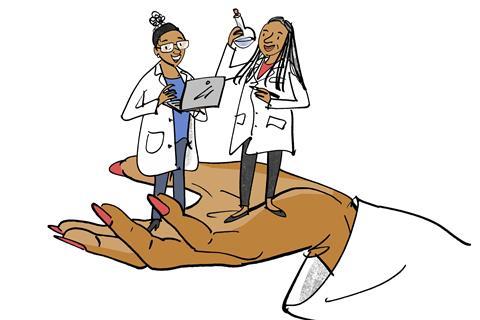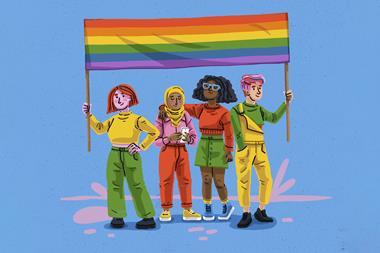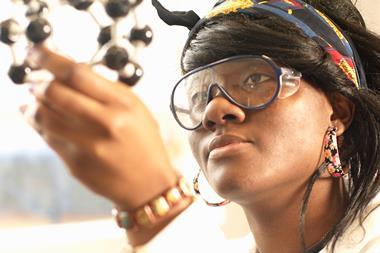Teaching that shows we belong in science

Growing up in predominantly white schools and cities, we noticed a systemic exclusion of Black people from curricula, evident through the lack of accurate Black history in our textbooks, Black teachers in our classrooms, and even common Black names in word problems taught in our elementary schools. Current and persistent societal examples include the lack of representation of darker skin in medical manuals and neglecting to include Black culture in chemistry education.
As products of this education, we thought this was just how chemistry was supposed to be: unrelatable, inapplicable and supposedly objective. It was not until taking classes with Black women scientists as biochemistry majors at Spelman College – a historically Black women’s college and the number one historically Black higher-education institution in the US – that we learned that science is not truly objective. Information historically viewed as scientifically factual is actually a product of bias, prejudice and political agendas. The Spelman Difference, however, has shown us that subjectivity in science can be rooted not in exclusivity, but rather in inclusivity, familiarity and relatability.
Aliyah’s perspective
It took nearly 19 years of my life for me to realise that science should be just as accessible to me and those who look like me as it is to any other group of people. I’ve almost always been led to believe that there was only one correct way of teaching the information I absorbed. This approach conveyed the general ideas of the scientific topics, and even introduced broader applications – but rarely demonstrated examples from across cultures. Because science was heavily constructed by those in positions of privilege and power, it has been taught so that it reflects the experiences of the majority. When I arrived at Spelman, I was surprised yet extremely thankful for lessons that finally reflected concepts and ideas that related to me personally. Spelman’s culturally comprehensive courses taught me that inclusivity is a valid expectation for my education.
In my second semester of organic chemistry, I completed a group project about nail polish and its effects on Black women. We learned about the chemical components of nail polish, how it works, the materials and techniques used to produce it, and the dangers of associated toxins, which is of the utmost importance because of Black women’s significant participation in the industry. This opportunity to see how chemistry relates to a common aspect of Black culture not only furthered our understanding of the science; it also helped bridge an ongoing disconnect between Black people and chemistry, a disconnect that has contributed to disparities and serious health issues in the Black community. This project also showed us that we grew up casually interacting with chemical concepts that have usually been taught in a distant and complicated manner. It was such a relief to see firsthand that struggle wasn’t a necessity for grasping complex topics like organic chemistry.
Assignments that started off as course requirements grew into inspirations for my current career goal of connecting my biomedical research interests with my social justice passions, showing me that it is more than possible to increase the representation of Black culture and issues in science.
Jalyn’s perspective
I appreciate the objectivity and concreteness of chemistry and believe that is what sparked my initial interest. However, it always felt like something was missing; chemistry wasn’t something I could see, feel or experience.
Since childhood, I have been conditioned to only engage with Stem inside the classroom. Of course, I knew science was everywhere. But without examples of how I can see what I study, I was not able to make those connections.
The chemistry department at Spelman engaging in culturally relevant education has brought on a feeling of worthiness and acceptance I longed to achieve; it is like I finally found somewhere to fit. For so long, I separated life and chemistry (ironic because chemistry is one of the foundations of life), but through the Beyond the Experiment Modules in the lab and small real-life examples in lectures, I was able to see that the mechanisms we learn about can be applied to real life. For example, through one of the modules that required us to interview students with international roots for traditional alternatives to pain relief, I was able to explore Haitian remedies through a chemical perspective. This assignment challenged the way we view medicine, as the current pharmaceutically centered narrative has conditioned us to view non-conventional medical practices as ineffective or inadequate. I, along with the rest of society, have become engulfed by the complex chemical practices of major pharmaceutical corporations and failed to realise that there is value in these cultural alternatives. This simple concept validates the lived experiences of countless individuals across the African Diaspora.
The future
All our Stem experiences have worked together to shape us into who we are as Black women scientists. However, the earlier, more exclusive experiences should not be esssential to successfully matriculate into science, but instead should show that we need to make a more conscious effort to diversify representation. Realising that chemistry exists far beyond the walls of the classroom has fueled us into this field, and we are grateful we have been able to find our place in something that at first seemed so inaccessible. We are able to contribute to something spectacular: the ethical coexistence of the objectivity of fact and the subjectivity of experience.
While we do not believe Black women should carry another burden of advocacy, we are passionate about preventing the ongoing exclusion of Black experiences from education. As a result, Black women like us will continue to make space for each other, help other Black women realise their potential to succeed in anything they desire, and actively advocate for everyone’s inclusion in all the scientific spaces we enter.












No comments yet